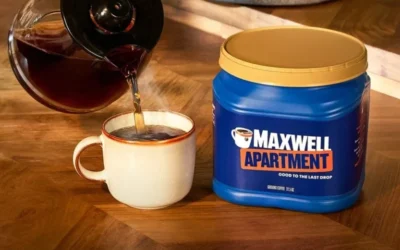
Maxwell House

Maxwell House Rebrand: “Maxwell Apartment” Misses the Mark
For the first time in its 133-year history, Maxwell House is changing its name. The brand is temporarily rebranding itself as “Maxwell Apartment.” This bizarre move has coffee lovers across the country asking one big question: why mess with a name that has worked for more than a century? When your coffee tastes the same, why change the name? Loyal fans are baffled. This feels like yet another case of a heritage brand hiring marketing people with hairbrained ideas. Instead of honoring tradition, they’re gambling with brand identity—and risk ending up like other once-beloved brands that lost their way, such as Cracker Barrel. What the Change Actually Means Kraft Heinz, the parent company of Maxwell House, insists the coffee itself hasn’t changed. The flavor, the beans, and the recipe are all the same. The name swap is simply a marketing stunt. According to the company, “Maxwell Apartment” reflects the reality that more Americans rent than own homes. To push the message, they’re even offering a quirky deal: consumers can “lease” a year’s supply of coffee—four giant canisters—for about $40 on Amazon, complete with a novelty lease agreement. (MORE NEWS: General Motors CEO Pulls Back on EV Ambitions) On paper, it’s supposed to be clever. In practice, it feels like a gimmick that trivializes real housing struggles while doing nothing to strengthen the product’s appeal. Why This Is So Bizarre This rebrand doesn’t just raise eyebrows; it raises real questions about corporate decision-making: Heritage should matter. Maxwell House is a name etched in American culture since 1892. You don’t just tinker with that legacy for a quick PR stunt. It’s confusing. The metaphor falls flat and risks alienating loyal drinkers. It’s tone-deaf. Tying your coffee brand to housing stress feels like an attempt to profit off economic anxieties. That’s a strange, uncomfortable angle. Nothing actually changes. The product and taste remain the same. So what’s the point? Instead of generating trust, this rebrand sends the message that the company is flailing for attention. What They Were Probably Trying to Do To be fair, we can guess the strategy behind this move: Appeal to younger renters. The campaign may aim at Gen Z and millennial renters who feel disconnected from legacy brands. Create viral buzz. Big name changes grab headlines—and in that sense, Maxwell succeeded. Highlight affordability. Framing coffee as something you can “lease” cheaply may reinforce value at a time when café lattes cost $7. The problem is that shock tactics don’t build lasting loyalty. They create chatter, yes, but they risk eroding trust that took more than a century to earn. A Better Rebrand: Back to the Metal Cans If Maxwell House really wanted to refresh its brand without alienating loyalists, it should look backward, not sideways. (MORE NEWS: Ditch the Pavement: Why Running Is Aging You Faster) Many longtime fans remember the cool metal cans Maxwell House used to come in. Those sturdy blue tins weren’t just containers—they were Americana. People repurposed them to hold nails, screws, paintbrushes, and other garage essentials. They were practical, collectible, and they reinforced the brand’s identity as part of everyday American life. Bringing back the metal cans would be the kind of rebrand that makes sense: It honors tradition. Instead of erasing the past, it celebrates it. It’s useful. Consumers love packaging they can reuse instead of throw away. It’s nostalgic. It connects with older customers while introducing younger ones to something authentically retro. It’s sustainable. In an era focused on reducing waste, durable packaging is a win-win. Imagine the buzz if Maxwell House announced it was reintroducing its classic tins—fans would buy them not just for coffee but for the practical value. That’s the kind of move that strengthens a brand rather than confusing it. Why Companies Shouldn’t Fix What Isn’t Broken Legacy brands like Maxwell House thrive on trust and familiarity. Customers want the comfort of knowing exactly what they’re buying. When companies chase novelty for novelty’s sake, they risk undermining the very reason people stayed loyal in the first place. Marketing departments sometimes forget: people don’t always want clever—they want consistent. Maxwell House has built more than a century of goodwill around its name. Changing it, even temporarily, creates unnecessary confusion. And let’s be clear: housing struggles, inflation, and affordability are not fun topics to play with in a campaign. People want their morning cup of coffee to be comforting, not a reminder of economic stress. The Takeaway Maxwell House’s temporary leap to “Maxwell Apartment” is an odd reminder of how fragile brand identity can be when companies chase stunts instead of substance. A name that survived world wars, depressions, and countless coffee trends is suddenly being bent for a marketing gag. That feels small for a brand that once stood tall in the pantheon of American staples. What Maxwell House—and other classic brands—should remember is this: consumers crave authenticity. They don’t need gimmicks to connect with a product that’s already part of their daily lives. A bold move isn’t automatically a good move, and relevance doesn’t come from making fun of housing struggles. It comes from reminding people why they loved you in the first place. If Maxwell House wants to spark loyalty and conversation, a smarter play would be to lean into its heritage. Bring back the metal cans. Celebrate the history. Remind people that tradition has value in a world that changes too quickly. That kind of move would feel innovative without being absurd. Instead of trading its name for a punchline, Maxwell House should double down on what it does best: brewing coffee that has fueled American mornings for generations. That’s a story worth telling—no apartment lease required. Expose the Spin. Shatter the Narrative. Speak the Truth. At The Modern Memo, we don’t cover politics to play referee — we swing a machete through the spin, the double-speak, and the partisan theater. While the media protects the powerful and buries the backlash, we dig it up and drag it into the light. If you’re tired of…
